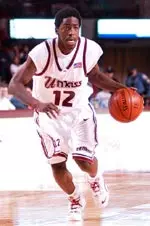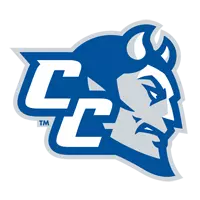University of Massachusets Athletics

2002-2003 UMass Basketball Season Preview
August 27, 2002 | Men's Basketball
Aug. 27, 2002
Complete Release in PDF Format![]()
![]() Download Free Acrobat Reader
Download Free Acrobat Reader
2002-2003 Quick Facts
Institution: University of Massachusetts
Location: Amherst, Mass., 01003
Founded: 1863
Enrollment: 23,673
Colors: Maroon & White
Nickname: Minutemen, UMass
Home Court: William D. Mullins Memorial Center
Affiliation: NCAA Division I
Conference: Atlantic 10
Chancellor: John Lombardi (Pomona, 1963)
Athletic Director: Ian McCaw (Laurentian, 1985)
Athletic Director's Phone: (413) 545-9652
Basketball Information
Head Coach: Steve Lappas (CCNY, 1977)
Record at UMass: 13-16 (one year)
Career Record: 243-188 (14 years)
Assistant Coaches: John Leonard (Manhattan, 1982), Andrew Theokas (William & Mary, 1992), Chris Walker (Villanova, 1992)
2001-02 Overall Record: 13-16
2001-02 A-10 Record/Finish: 6-10/Fourth-East
2001-02 Postseason Result: None
Lettermen Returning/Lost: 7/7
Starters Returning/Lost: 3/2
Returning UMass Lettermen (Seven) Pos. No. Name Ht. Wt. Cl. G 12 Anthony Anderson 5-11 175 Jr. F 40 Micah Brand 6-11 243 Sr. F 34 Raheim Lamb 6-5 190 Jr. G 11 Kyle Wilson 6-2 175 So. F 0 Brennan Martin 6-6 190 So. G 14 Paco Kotaridis 5-11 185 Jr. F 2 Jackie Rogers 6-8 230 Sr.
UMass Lettermen Lost (Seven) Pos. No. Name Ht. Wt. Exp. G 30 Shannon Crooks 6-2 222 3VL C 33 Kitwana Rhymer 6-10 256 4VL F 21 Eric Williams 6-8 243 2VL G 24 Jameel Pugh 6-4 200 2VL F/G 1 Willie Jenkins 6-6 200 2VL F 3 Ronell Blizzard 6-8 205 4VL G 22 Dwayne Killings 6-0 180 1VL
Newcomers (Six) Pos. No. Name Ht. Wt. Cl. G 1 Michael Lasme 6-1 190 Fr. F 3 Stephen Briggs 6-9 220 Fr. F 4 Gabriel Lee 6-9 225 So. F 21 Alassane Kouyate 6-9 225 Fr. F 22 Jeff Viggiano 6-6 205 Fr. G 50 Marcus Cox 6-4 190 Jr.
New-Look Minutemen Embark on Lappas' Second Season: One might not blame UMass Coach Steve Lappas for handing out nametags to everyone associated with his program when practice begins this fall, as his 2002-03 roster will feature seven players who weren't in uniform a year ago. But, Lappas' focus is on finding the right mix of the old and the new that will propel his Minutemen into the postseason for the first time since the 1999-2000 campaign, and just the second time since the school's nine-year run of postseason trips ended in 1998-99. Introduced as the school's 19th head coach on March 26, 2001, Lappas' first UMass team started fast, beating eventual Elite Eight entrant Oregon, 62-58, at the Springfield Civic Center, and handing NCAA Tournament participant North Carolina State a 69-62 setback in Raleigh, N.C., en route to the program's best start (4-0) since the 1995-96 campaign. But, Massachusetts would finish the year at 13-16, and its 12-year run of winning Atlantic 10 Conference seasons ended with a 6-10 league mark. The 2002-03 UMass team will be built around three returning starters, four other letterwinners and one of the school's most talented recruiting classes in recent memory. Those seven returnees provided 45.6 percent of the scoring and 42.7 percent of the rebounding a year ago. Lappas' returning cast is headlined by junior guard Anthony Anderson, the 2002 Atlantic 10 Rookie of the Year, a pair of senior frontline players, forward/center Micah Brand and forward Jackie Rogers, and one of the A-10's best defenders in junior forward Raheim Lamb. A pair of sophomores, guard Kyle Wilson and forward Brennan Martin, also return as does junior walk-on guard Paco Kotaridis. Anderson is UMass' top returning scorer at 10.0 ppg (he ranked second on the squad a year ago behind Shannon Crooks' 14.6 ppg), and should challenge for All-Atlantic 10 honors in his final two seasons. As a sophomore, he drained a team-high 71 three-pointers, the eighth-best single-season effort in school history, and hit 41.9 percent of this three balls against league foes. Led by Anderson's long-range bombs, Massachusetts nailed a school single-season record 204 three-point goals over 29 games a year ago, 24 more than the old standard established by the school's 1994-95 squad over 34 games. One of two seniors on Lappas' second squad, Brand is UMass' top returning rebounder (5.7 rpg) and second-leading scorer at 9.3 ppg, and like Anderson, is an All-Atlantic 10 candidate. His scoring and rebounding averages have improved every year he has worn the Maroon and White, from 4.3 ppg and 3.3 rpg as a freshman in 1999-2000, to 8.4 ppg and 4.7 rpg in his sophomore campaign and last year's 9.3 ppg and 5.7 rpg marks. How Brand went a year ago usually determined UMass' fate, as eight of his double-digit scoring efforts resulted in Minuteman wins. The 2001 co-winner of the A-10's Chris Daniels Most Improved Player Award, Brand heads into his senior campaign just 369 points shy of becoming the school's 36th career 1,000-point scorer. He has 75 career blocked shots, and needs 11 to move into the UMass top 10 and overtake current Rhode Island assistant coach and former Minuteman standout Tyrone Weeks for 10th. The other UMass senior is Rogers, who elected to sit out the 2001-02 season as a redshirt so that he would complete his degree in the same year that his eligibility ended. He practiced with the Minutemen a year ago, and has adjusted to Lappas' motion offense. Rogers contributed 6.6 ppg and 3.9 rpg as a reserve in 2000-01, but figures to be a starter in his final collegiate season. Lamb, meanwhile, was named to Eastern Basketball's Atlantic 10 All-Defensive squad as a sophomore, when he drew 16 starts in 29 appearances. He averaged 5.7 points and 3.4 rebounds overall as a rookie, but his marks against A-10 foes were slightly higher at 6.2 ppg and 3.9 rpg. One of two former Massachusetts prep standouts on the 2002-03 roster, Lamb tied for third on the team in steals a year ago. Wilson and Martin showed flashes of greatness as rookies, and both are expected to provide more consistent play as sophomores. Wilson averaged 3.9 ppg overall on the year, but contributed 5.3 ppg against A-10 foes. An outstanding long-range shooter, he hit 38.0 percent from three-point range against league foes (33.8 percent overall from bonus distance), and turned in a career-high 17-point effort in UMass' 63-53 homecourt victory over Temple. After averaging 1.4 ppg as a freshman, Martin hopes to play a more prominent role in 2002-03. He tallied a career-high nine points in UMass' 67-65 victory at St. Bonaventure as a freshman.
The New Guys: The UMass coaching staff inked four high school standouts in 6-1 guard Michael Lasme, 6-9 forward Alassane Kouyate, 6-9 forward Stephen Briggs and 6-6 guard/forward Jeff Viggiano to national letters of intent, and all figure to contribute as freshmen. In addition, 6-4 guard Marcus Cox, a UConn transfer, and 6-9 forward Gabriel Lee are eligible after sitting out the 2001-02 campaign, and will be in the hunt for starting positions. A consensus top 70 player, Lasme averaged 25.0 ppg and 5.0 rpg in his final prep campaign at Burlington's (N.J.) Life Center Academy, and figures to challenge for a starting spot in the UMass backcourt and Atlantic 10 Rookie of the Year honors as a freshman. Ranked No. 64 by ESPN.com and No. 70 by HoopScoop, Lasme led the Penn-New Jersey League in scoring the past two years. Kouyate and Briggs figure to battle for playing time along the frontline as rookies. Kouyate, ranked as the nation's 285th-best prep by HoopScoop, averaged 15 points and 11 rebounds as a prep senior at Walsh (Ohio) Jesuit High School. Briggs, meanwhile, was rated as the nation's 45th-best inside player in the Class of 2002 by Prepstars, and 128th overall in the Class of 2002 by the same publication. He averaged 18 points and nine rebounds as a prep senior at Houston's (Texas) Westside High School. The lone signee during the spring signing period, Viggiano earned Connecticut's state Gatorade Player of the Year honor after averaging 28 points and seven rebounds per game as a senior at Suffield (Conn.) High School. He set school records for points in a game (43) and a career (1,540). Cox was able to practice with the Minutemen a year ago after transferring from UConn, and is the only player on the UMass roster with NCAA Tournament playing experience. He figures to challenge for a starting backcourt spot after averaging 2.7 points and 1.7 rebounds as a UConn sophomore. A consensus Top 50 prep, Cox earned Connecticut High School Player of the Year honors and was a fourth team Parade Magazine All-American after a senior campaign when he averaged 18.1 points, 12.2 rebounds and 8.8 assists at Bridgeport's (Conn.) Kolbe Cathedral High School. Lee's size and strength will be a welcome addition to the Minuteman frontcourt, which lost three players to graduation. He attended UMass last year, but did not play basketball. Lee spent the 2000-01 season at Northfield (Mass.) Mount Hermon, where he averaged 21.4 points and 4.3 rebounds before being sidelined by a separated right shoulder. At Mitchell-Baker (Ga.) High School, he was the best player on a team that captured three consecutive state titles and fashioned an 85-6 record with three state championships. A fifth UMass signee, 6-9 forward Rashaun Freeman of Schenectady (N.Y.) High School, will attend UMass during the 2002-03 academic year, but will not play basketball. He averaged 17.8 points as a prep senior en route to 2002 Albany Times Union Player of the Year honors and was ranked as the 100th-best player in the Class of 2002 by HoopScoop.
What's Gone: Massachusetts lost a pair of starters in guard Shannon Crooks and center Kitwana Rhymer, along with reserve forwards Eric Williams and Ronell Blizzard, to graduation. All four left UMass with degrees in hand. Crooks, who earned second team All-Atlantic 10 honors from Basketball America and third team All-League recognition from Eastern Basketball, was UMass' leading scoring as a senior at 14.6 ppg. The tri-captain led the Minutemen in scoring (14.6 ppg), steals (37), assists (116) and minutes played (1,017) as a senior, and ranked second in three-point goals made (51) and attempted (143). Crooks, the first UMass player since Donald Russell in 1981-82 to lead the team in scoring, assists and steals in the same season, became only the fourth player in school history to record career totals of 1,000 points and 300 assists, joining Al Skinner, Alex Eldridge and Charlton Clarke. Rhymer, the 2001 Atlantic 10 Defensive Player of the Year, led the Minutemen in rebounding (6.0 rpg), field goal percentage (.533) and blocked shots (47) as a senior, while ranking fourth on the team in scoring (8.9 ppg). He finished his career ranked fifth on both the school's all-time block (184) and field goal percentage (.525) lists, while Rhymer's 121 games played equaled the ninth-best career total in school history. Williams appeared in all 29 games a year ago, drawing four starts, and averaged 5.7 points and 4.7 rebounds per game. Blizzard played in 24 games as a senior, with three starts, and contributed 1.4 points and 1.6 rebounds. In addition, two sophomore reserves, guard Jameel Pugh and forward Willie Jenkins, transferred out of the program at season's end. Pugh averaged 5.3 ppg and 2.1 rpg in 12 appearances, while Jenkins contributed 3.0 ppg and 2.2 rpg in 24 games.
The Coach: As noted on page 2, a new era in UMass basketball began on March 26, 2001, when Steve Lappas (City College of New York, 1977) was introduced as the school's 19th head coach. In his 15th season as a head coach, Lappas owns a 243-188 (.564) record, including a 13-16 (.448) one-year mark on the Minuteman bench. Lappas came to UMass after nine highly-successful seasons (1993-2001) at Villanova University, where he guided the Wildcats to a 174-110 (.613) record, seven postseason appearances (four NCAA, three NIT), six, 20-win campaigns, a Big East regular-season title (1996-97), a Big East Tournament crown (1994-95) and the school's first-ever National Invitation Tournament championship (1993-94). He ranks as the sixth-winningest coach in Big East history (and was the third-winningest among active league coaches at the time he left the Main Line with 97 Big East victories). At Manhattan (1988-92), Lappas improved the Jaspers' win total every year, going from seven in 1988-89, to 11 the following year, 13 in his third season and 25 in his fourth and final campaign (1991-92) en route to a 56-62 (.475) four-year mark. His final Manhattan team won the Metro Atlantic Athletic Conference regular-season title and advanced to the NIT's third round. Equally impressive as Lappas' on-court record is the classroom performance of his players, as all of his seniors at Massachusetts, Villanova and Manhattan graduated. Prior to moving to Manhattan, Lappas spent four seasons as an assistant to Rollie Massimino at Villanova, and was a member of the Wildcats' 1985 national championship staff. Coach Lappas' staff includes assistant coaches John Leonard, Andrew Theokas and Chris Walker, and director of operations Paul Culpo.
Second-Year Improvement: If history holds true to form for UMass coach Steve Lappas, the Minutemen will see a big improvement in the victory column this season. Why? Because in each of Lappas' first two head coaching stops, at Villanova and Manhattan, he won an average of eight more games in his second season on the bench than he did in his rookie season. At Villanova, he posted eight victories in his first season (1992-93), but went 20-12 in his second year and captured the school's first-ever National Invitation Tournament championship. In his first head coaching stop, at Manhattan, Lappas went 7-21 in year one, but improved to 11-17 the second season. Improvement in year two has been a trend among basketball coaches in Amherst, too, as eight of UMass' last nine head coaches have won more games in their second campaign than they did in year one. Coach Robert T. Curran engineered the biggest turnaround over that stretch, a nine-game improvement in the win column from four victories in 1952-53 to 13 in his second year, while John Calipari saw a seven-game improvement in his victory total from 10 wins in his rookie season to 17 and a postseason bid (NIT) in year two. Calipari is the only UMass coach to follow a losing rookie campaign with a postseason bid the next season.
A Grand For Brand: UMass senior forward/center Micah Brand heads into his final campaign with 631 points, just 369 points shy of becoming the school's 36th career 1,000-point scorer. Having improved his scoring and rebounding marks every year of his Minuteman career, he will need to average 12.3 ppg over the 30-game slate to reach the 1,000-point mark. Since David Brown topped the 1,000-point mark as a senior in 1988-89, UMass has had at least one player reach either the career 1,000- or 2,000-point plateau in 13 of the past 14 seasons, including each of the last nine campaigns. Nearly half (17) of UMass' 35 career 1,000-point scorers, and both of the program's 2,000-point men, have come over the last 14 seasons.
UMass' Double AA Looks to Build on A-10's Rookie Award: Past UMass A-10 Rookie of the Year honorees have gone on to enjoy outstanding careers in Amherst, a trend junior guard Anthony Anderson, the award's 2002 winner, hopes to continue. As a sophomore, Anderson was UMass' top three-point shooter at 38.8 percent, and he also led the Minutemen in three-point goals made (71) and attempted (183). He ranked second on the team in scoring (10.0 ppg), assists (100), minutes played (985) and steals (31). Just the fourth Minuteman to earn the league's top rookie honor, Anderson follows in the footsteps of Marcus Camby (1994), Jim McCoy (1989) and Edwin Green (1989), a trio that combined to score 5,148 points as Minutemen, earn eight All-Atlantic 10 certificates (including five first team awards) and produce the school's first-ever national player of the year in Camby.
Diplomatic Immunity: Incoming UMass freshmen Michael Lasme and Alassane Kouyate both played prep hoops in the United States, but claim hometowns on the other side of the Atlantic Ocean. Lasme, who can speak three languages, is a native of Abidjan, Ivory Coast in Africa. He moved to France when he was 12, and has lived in the United States the past two and a half years. Not to be out done by his new teammate, Kouyate, a native of Bamako, Mali, can speak five languages. He has been in the United States for the last three years. In addition, Massachusetts junior walk-on guard Paco Kotaridis hails from Athens, Greece, giving the Minutemen a trio of international diplomats on their 2002-03 roster.
Back to Maui: The 2002-03 Massachusetts basketball season will tip-off in Hawaii, as the Minutemen are part of the eight-team 2002 EA Sports Maui Invitational hosted by Chaminade University in the historic Lahaina Civic Center. It will mark UMass' second trip to Maui, and first since a fourth-place finish in the 1996 tournament. While pairings for the Nov. 25-27 event have not been set, the field includes six 2002 postseason entrants. Half of the field (national runner-up Indiana, Sweet 16 entrant Kentucky, Utah and Gonzaga) earned NCAA Tournament invites a year ago, while Virginia and Arizona State played in the NIT. UMass is 4-2 all-told in the nation's 50th state, having posted a 3-0 record en route to the 1995 Rainbow Classic crown and a 1-2 mark a year later in the Maui Classic.
Lappas No Stranger to Maui Success: When UMass Coach Steve Lappas sets foot in the Lahiana Civic Center for the 19th Maui Invitational, he'll look to keep his record in the building perfect, as he led his fourth Villanova team to the 1995 Maui crown. The Wildcats downed Wisconsin (66-58), Santa Clara (77-65) and North Carolina (77-75) to claim the title, then went on to finish 26-7 and capture the Big East regular-season title in 1995-96. Lappas will attempt to become just the fourth coach in the event's history to win more than one Maui Invitational title, and the second to lead two different schools to the tournament's crown. Only Bill Frieder (three), Duke's Mike Krzyzewski (three) and Syracuse's Jim Boeheim (two) have won multiple Maui titles, with Frieder being the only coach to win the event at two different institutions (Michigan and Arizona State).
Another Tough Slate: Challenging schedules and UMass basketball have gone hand and hand for more than a decade, and that beat should continue for the Minutemen in 2002-03. The RPI Report ranked UMass' 2001-02 slate as the nation's 49th-toughest, marking the 10th time in the last 11 seasons the Minutemen ranked among the nation's top 50 in schedule strength. After opening the 2002-03 campaign in a loaded Maui Invitational that includes six postseason tournament teams from a year ago, including NCAA runner-up Indiana and Sweet 16 member Kentucky, UMass will return to the mainland for three consecutive games against 2002 NCAA Tournament entrants in Central Connecticut State, Boston College and UConn. The only other 2002 postseason tournament team the Minutemen face during the non-conference season is North Carolina State, a program that advanced to the NCAAs for the first time in nearly 10 years a year ago. In the A-10, Massachusetts will play more than half (nine) of its 16-game league slate against league members that earned postseason bids a year ago. The Minutemen will tackle NIT entrants Temple, St. Joseph's and St. Bonaventure on a home and home basis, while meeting NCAA Tournament team Xavier, and NIT participants Richmond and Dayton once each. Final 2001-02 opponent overall records and RPIs for UMass' 2002-03 non-conference and A-10 foes can be found on page 11 of this outlook.
The Baker's Dozen: Over the last 13 seasons, Massachusetts owns a 282-141 (.667) overall record, an average of 21.7 wins per season. The Minutemen have made 10 postseason appearances over that stretch, while recording seven, 20-win campaigns, 12 winning conference records and 11, .500 or better campaigns in that stretch. After posting no winning campaigns, just two .500 records and a 53-133 (.285) record in their first 13 seasons in the A-10, UMass has gone 144-66 (.686) in regular-season league play over the last 13 campaigns en route to 10 conference crowns (five regular season, five tournament). Eight times over the last 13 seasons, the Minutemen have won at least 11 league games. In the Atlantic 10, no program that has called the league home in each of the last 13 years has won more games overall than UMass (282). Xavier, though, does have 285 victories to its credit over that time frame, but the Musketeers didn't join the A-10 until the 1995-96 campaign.
Getting it Done With Defense: The key to UMass' success a year ago was its play at the defensive end of the floor, a longtime trademark of the Minuteman program that continued in Steve Lappas' rookie season in Amherst. The Minutemen were 11-1 on the year when allowing 62 or fewer points, and yielded just 58.3 ppg in their wins, compared to 72.0 in their losses. A year ago, Massachusetts ranked second in the A-10 in three-point percentage defense (.317), third in field goal percentage defense (.406) and fourth in scoring (65.9 ppg) defense. In league play, the Minutemen were fourth in three-point percentage defense (.324), fifth in scoring defense (.365) and sixth in field goal percentage defense (.420).
More on the D: How good was UMass' defense last season? Consider that the Minutemen held their opponent under both their season scoring and field goal percentage marks in 19 of 29 starts. Massachusetts was 12-7 on the year when holding its opponents under both their season scoring and field goal shooting averages, 1-9 when allowing their foes to exceed one or both of their season marks. Here's a look at some of UMass' defensive gems during the 2001-02 campaign, a season in which it held its opponents to season marks below 70.0 ppg and 42.0 percent field goal shooting for the 11th consecutive year:
The Minutemen at Mullins: Massachusetts, which went 8-6 at the Mullins Center last season (9-6 overall at home, including a win over eventual Elite Eight entrant Oregon at the Springfield Civic Center), stands 84-29 (.743) entering its 11th season of play in the building, 59-18 (.766) all-time vs. A-10 opponents and 25-11 (.694) vs. non-league foes. The Minutemen have posted a winning homecourt record for 20-straight seasons, including each of the 10 seasons they have called the Mullins Center home.
Minutematters: Trends to ponder as Massachusetts begins its second season under the direction of coach Steve Lappas, and its 94th intercollegiate basketball campaign . . .







